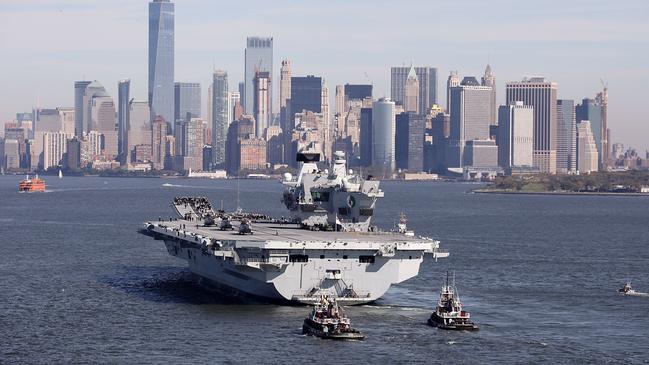Navy is big winner in Boris Johnson’s $29bn defence spending spree
Boris Johnson has pledged to restore Britain’s status as the ‘foremost naval power in Europe’.

Prime Minister Boris Johnson has pledged to restore Britain’s status as the “foremost naval power in Europe” and promised significant investment in new warships.
In a speech on his vision for the armed forces overnight Thursday, Mr Johnson announced a four-year funding deal, which he said was worth £16.5bn ($29bn), for the Ministry of Defence that would facilitate a generational upgrade of the military.
The government also highlighted offensive cyber-capabilities, now structured within a National Cyber Force that includes personnel from the military, GCHQ, MI6 and the Defence Science and Technology Laboratory. The force is intended to disrupt terrorist communications and degrade hostile states’ infrastructure.
Other features of the deal included a Space Command, an artificial intelligence agency and investment in combat drones, Mr Johnson said.
The biggest winner will be the Royal Navy after Mr Johnson set out plans for the service to take on a bigger role. He confirmed that Britain would get eight Type-26 frigates, sophisticated anti-submarine ships, as well as five Type-31 frigates, which are cheaper, all-purpose warships.
New fleet support ships to carry food and ammunition in the Royal Fleet Auxiliary will also be built, along with multi-role research vessels. The various projects confirmed will be a boon to shipbuilders and are expected to support up to 10,000 jobs. The blueprint will be a boost to the Union, too, as Scotland, Northern Ireland and Wales have a significant proportion of the UK’s shipyards and linked industries. The government said the blueprint would secure “jobs, prosperity, security and the Union”.
Mr Johnson said the aircraft carrier HMS Queen Elizabeth would be launched on its first carrier strike force operation next year, and would sail to the Mediterranean, the Indian Ocean and east Asia. HMS Prince of Wales is up to 18 months behind in its timetable.
In a sign that Britain will seek to boost international co-operation, Australian and Canadian personnel and assets are expected to be invited to operate from one of the carriers. Proposals are being considered for one of the carriers to be permanently stationed either in the Middle East or further east in the southern hemisphere, it is understood. A military source said the focus on the Royal Navy was “a paradigm shift”, adding: “Boris Johnson has refocused defence to its historic maritime axis.”
Mr Johnson told MPs by videolink that in the coming years a soldier in hostile territory would be “alerted to a distant ambush by sensors on satellites or drones”, with artificial intelligence helping to devise the best response.
Defence Secretary Ben Wallace told Times Radio: “For pretty much the last 20-30 years we had great ambition but it was never matched by spending. We had feast followed by famine, cuts followed by spending. I’m determined to put some of those things right and show we can be trusted not to repeat mistakes of old.”
Labour leader Keir Starmer criticised the announcement as “spending … without a strategy” and questioned how it would be paid for. “There is no clarity over the government’s strategic priorities,” he said.
Defence analysts have said the settlement is more generous than was expected. Military insiders said the army would lose out, with cuts expected for heavy armour programs and a drop in personnel numbers.
Christopher Miller, America’s acting secretary of defence, said the US “applauds the announcement”.
The Times







To join the conversation, please log in. Don't have an account? Register
Join the conversation, you are commenting as Logout